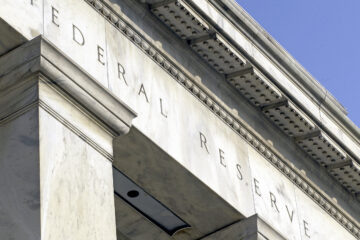US
The rally in the U.S. markets continued this week, sustained by the optimistic outlook on the resolution of the US-China trade disputes. The S&P 500 and the Nasdaq Composite were both up 0.85% w-o-w, closing at 3,093.08 and 8,457.31, respectively. The Dow Jones Industrial Average recorded a weekly gain of 1.22%, ending at 27,681.24. All three indexes jumped to the record highs on Thursday, after China announced that its agreement with the U.S. would feature pledges to abolish tariffs on each other’s goods in phases. Although on Friday this positive sentiment was somewhat damped by President Trump’s narrative that he might not be willing to provide some concessions that China requires, the volatility in the markets did not substantially increase.
The optimism about the de-escalation in the trade war and restoration of the global economic growth also triggered a sell-off of U.S. government bonds. Yields on the 10-year Treasuries surged to 1.92%, reflecting the current risk-on environment.
On Monday, Uber Technologies Inc. reported its third-quarter earnings. Although revenues were higher than expected, a decline in quarterly bookings and a total net loss of $1.1bn (18% more than in the same period of 2018) sent Uber’s shares down as much as 6% in after-hours trading. Conversely, Qualcomm, Inc. surpassed expectations reporting fiscal fourth-quarter sales of $4.81bn and giving a stronger-than-predicted projection for the earnings per share in the next quarter. This indicates that the smartphone demand might be slowly recovering after a recent downtrend.
Europe
European markets were also bolstered by the positive news about trade negotiations. The U.S. Commerce Secretary Wilbur Ross expressed a belief that tariffs on car exports to America can be avoided. Similarly, EU’s Jean-Claude Juncker’s statement that Washington will not be imposing restrictions supported risk appetite in the market. The Euro Stoxx 50 went up by 2.09% to 3,699.65, while the German DAX rose by 2.06%, ending at 13,228.56.
Italy’s bond yields exceeded those of Greece for the first time since 2008, making the Italian government the eurozone’s riskiest borrower. Although the country’s debt has a higher rating than Greece’s, dull prospects about the Italian economic growth add increased pressure on bond prices.
Meanwhile, Germany showed signs of revival, as indicated by the data on factory orders published on Wednesday. New manufacturing orders increased by 1.3% in September, in comparison with a drop of 0.4% in August. Even though this upswing must still be treated with caution, it suggests that the fears of recession can be at least temporarily relieved.
This is in line with the EU Commission’s growth forecast for the next two years, which was published on Thursday. The Commission forecasts a GDP growth in the euro area to reach 1.2%, both in 2020 and 2021. The projection hints that the slide into recession is not in the baseline, although an environment of particularly low growth and inflation might persist in the medium run.
This Sunday, the presidential election will be held in Romania and voters in Spain will be heading to the polls for the general election.
UK
Tuesday marked the last day of term for the UK parliament before it was dissolved ahead of the general election, which will be held on 12 December 2019. Analysts expect a dramatic campaign between Mr Johnson and the Labour Party leader Jeremy Corbyn, and the result is bound to set the direction of the final Brexit outcome.
On its Wednesday meeting, the Bank of England’s Monetary Policy Committee decided to maintain the official interest rate on its current level of 0.75%. UK GDP growth slackened this year, reflecting the global economic slowdown and uncertainty about Brexit. The Bank expects the end-of-the-year annual growth to reach 1%, rising to 1.6% in 2020. Following this news, the pound plummeted by 28% on Thursday but recovered to its previous levels by the end of the day.
The FTSE 100 closed at 7,359.38, recording an increase of 0.78%.
At the end of the week, rating agency Moody’s announced that it was changing its outlook on the UK’s credit rating from ‘stable’ to ‘negative’ as a result of ‘paralysis in policy-making’ caused by Brexit disputes. The current rating is Aa2 and has been unchanged since 2017.
Rest of the World
Chinese markets benefited from the progress in trade negotiations with the U.S. Moreover, China General Purchasing Managers’ Index (PMI) showed a recovery, climbing to 51.7 for October. The factory activity in China thus advanced at the fastest pace since February 2017. The Hang Seng Index (HSI) was up 2.03%, while the Hang Seng China Enterprises Index (HSCEI) rose by 2.45%. The Shanghai Composite recorded a modest increase of 0.2%.
On Thursday, Chinese yuan soared to its highest level since August, trading at 6.98 against USD.
On Friday, Japan’s Prime Minister Shinzo Abe authorized the country’s first economic stimulus package since 2016. The government intends to stimulate economic recovery and address the reduced global productivity. The plan will include increased government spending and investment. The data on third-quarter economic growth will be reported next Thursday. In the meantime, the Nikkei continued its upward trend and closed at 23,391.87 – the record high this year.
Saudi Arabia officially approved plans to float Saudi Aramco, a state energy giant. The kingdom intends to sell 1-3 per cent of the company and maintains it is worth at least $2tn. So far, investment banks still could not find consensus about a fair valuation range of the possibly world’s largest-ever IPO.
The price of gold suffered a greatest weekly drop in the past three years, plummeting by -3.7%. The record highs in the U.S. stock markets prompted investors to lean towards riskier assets. Similarly, leading U.S. banks such as J.P.Morgan and Citi closed its gold positions this week, seeking riskier alternatives.



0 Comments